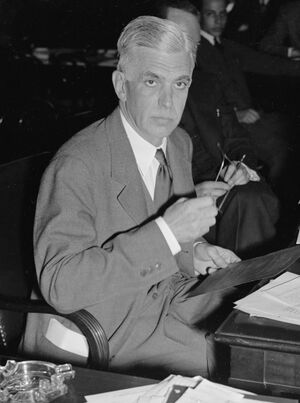Difference between revisions of "Harold Stanley"
(unstub) |
m (Text replacement - "/Department of " to "/Department/") |
||
| Line 31: | Line 31: | ||
Nevertheless, the [[Securities and Exchange Commission]] issued a ruling in [[1941]] requiring competitive, public, sealed bidding for all issues of registered holding companies and their subsidiaries under its jurisdiction. | Nevertheless, the [[Securities and Exchange Commission]] issued a ruling in [[1941]] requiring competitive, public, sealed bidding for all issues of registered holding companies and their subsidiaries under its jurisdiction. | ||
| − | Stanley was a principal witness in 1947 when the [[US/Department | + | Stanley was a principal witness in 1947 when the [[US/Department/Justice|Justice Department]] brought antitrust charges under the Sherman Act against seventeen investment banking firms, including Morgan, Stanley, and the Investment Bankers Association. The government failed to prove sufficiently that monopolistic practices existed in the investment banking business, and the case was dismissed. |
==Personal life== | ==Personal life== | ||
Revision as of 20:05, 20 December 2021
(banker) | |
|---|---|
 | |
| Born | 1885-10-02 Great Barrington, Massachusetts |
| Died | 1963-05-14 (Age 77) Philadelphia, Pennsylvania |
| Nationality | US |
| Alma mater | Hotchkiss School, Yale University |
| Parents | • William Stanley • Lila Courtney Stanley |
| Founder of | Morgan Stanley |
| Member of | Links Club, Skull and Bones |
One of the founders of Morgan Stanley | |
Harold Stanley (October 2, 1885 – May 14, 1963) was an American businessman and one of the founders of Morgan Stanley in 1935. For 20 years, he ran Morgan Stanley until he left the firm in 1955.
Contents
Early life
Stanley was born in Great Barrington, Massachusetts, the son of William Stanley, Jr. and Lila Courtney Stanley. William was an inventor with General Electric for whom the Stanley Works building was named in Pittsfield, Massachusetts.[1] He graduated from the Hotchkiss School in 1904[2] and Yale University in 1908. He was a member of the Skull and Bones secret society.[3]
Career
In 1915, Stanley joined Guaranty Trust Company, becoming vice-president in charge of the bond department the following year. He eventually spun the division off into a separate and subsidiary securities company, the Guaranty Company, where he worked in cooperation with J. P. Morgan, Jr.
In the years immediately after World War I, the Guaranty Company underwrote and sold millions of dollars in bonds for government and private organizations. In joint ventures with J. P. Morgan and Company it floated some of the largest bond issues to that time.
In 1927, Morgan invited Stanley to become a partner in his firm, replacing Dwight Morrow, who became the United States Ambassador to Mexico.[4] He made his name as a leader of the investment banking industry at J.P. Morgan, making the firm a strong player in securities offerings and especially the bond market, particularly after the Glass–Steagall Act separated commercial and investment banking.
In 1935, along with Henry Sturgis Morgan, J. P. Morgan's grandson and J. P. Morgan Jr.'s son, he helped found Morgan Stanley to take up the securities business that had to be given up by J. P. Morgan, and became the firm's senior partner when it was reorganized from a corporation to a partnership in 1941.
In 1938 he testified at the Temporary National Economic Committee hearings in opposition to competitive bidding among bond houses in the placement of bonds. At the time, he wrote a memorandum which argued that competitive bidding resulted in overpriced issues and poorer securities and would drive out the smaller bond houses.[5]
Nevertheless, the Securities and Exchange Commission issued a ruling in 1941 requiring competitive, public, sealed bidding for all issues of registered holding companies and their subsidiaries under its jurisdiction.
Stanley was a principal witness in 1947 when the Justice Department brought antitrust charges under the Sherman Act against seventeen investment banking firms, including Morgan, Stanley, and the Investment Bankers Association. The government failed to prove sufficiently that monopolistic practices existed in the investment banking business, and the case was dismissed.
Personal life
He married Edith Thurston, daughter of William Harris Thurston, in 1914. She died in 1934, and he married Louise Todd, widow of Seymour Parker Gilbert, in 1934. He had stepchildren, but no children from either of his marriages. He resided at 4 East 72nd Street on Manhattan's Upper East Side in New York City and died in Philadelphia in 1963.
Activities and interests
He was a member of the Links Club of New York, the National Golf Club, the Racquet and Tennis Club, and the Yale Club. He was a director of many companies including the Shell Caribbean Petroleum Corporation.[6]
Stanley played ice hockey at Yale University between 1906–1908 and later on the St. Nicholas Hockey Club in the American Amateur Hockey League.
Philanthropy
In 1940, he led the New York campaign to raise $1.5 million (Template:Inflation) for the United States Commission for the Care of European Children, a private organization providing relief to young war refugees.
References
- ↑ http://timesmachine.nytimes.com/timesmachine/1963/05/15/106221196.html?pageNumber=39
- ↑ https://web.archive.org/web/20150310133421/http://www.hotchkiss.org/alumni/Accomplishments.aspx
- ↑ Beard, Patricia, Blue Blood and Mutiny: The Fight for the Soul of Morgan Stanley, HarperCollins, 2008, pp. 10, 22.
- ↑ http://timesmachine.nytimes.com/timesmachine/1963/05/15/106221196.html?pageNumber=39
- ↑ https://prabook.com/web/harold.stanley/1044639
- ↑ http://timesmachine.nytimes.com/timesmachine/1963/05/15/106221196.html?pageNumber=39